Two-and-a-half tons shouldn’t move like this. But the 2025 Aston Martin DBX707 just keeps snaking through tight and twisty Napa Valley roads like a smaller sport sedan.
The DBX707’s dance moves aren’t entirely new, and neither is its monstrous 697 hp, but both represent refinements for the ultraluxury SUV that first debuted for the 2021 model year. The agility I’m feeling comes by way of new tuning for an already advanced chassis, while the 697 hp is now the only choice for buyers as the 542-hp option goes away for 2025. For good measure, Aston Martin also gives its sporty SUV a new infotainment system and some styling tweaks inside and out.
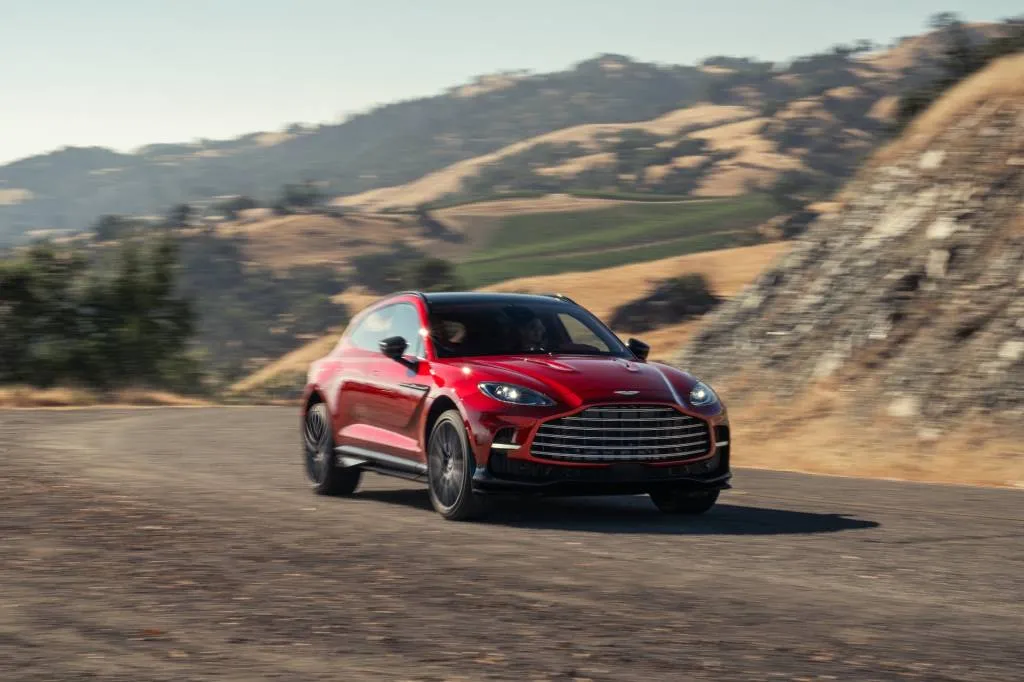
2025 Aston Martin DBX707
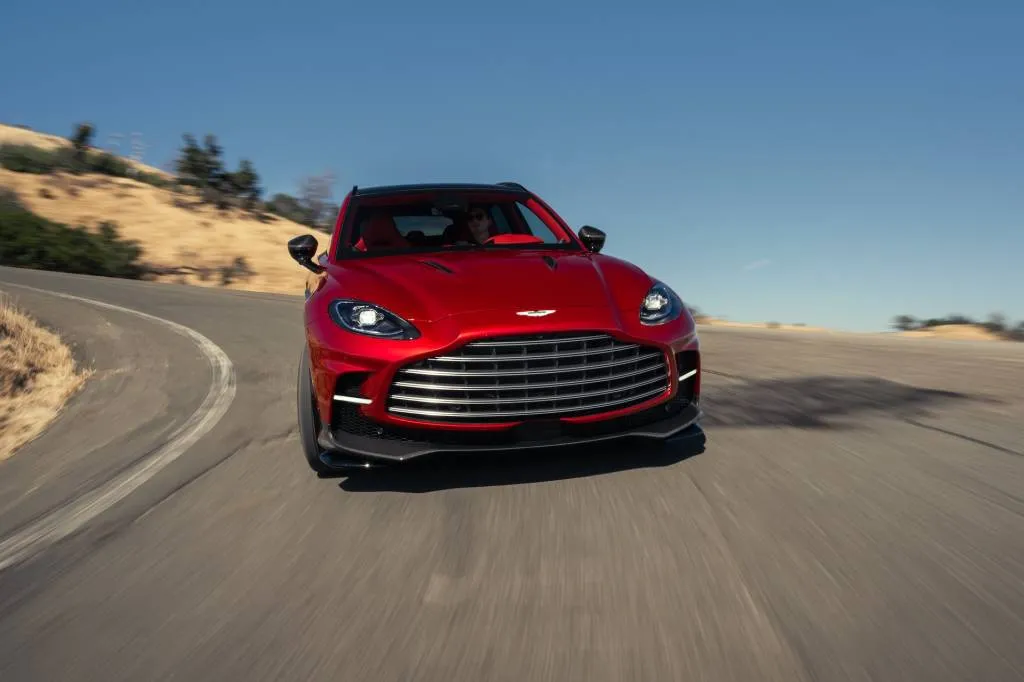
2025 Aston Martin DBX707
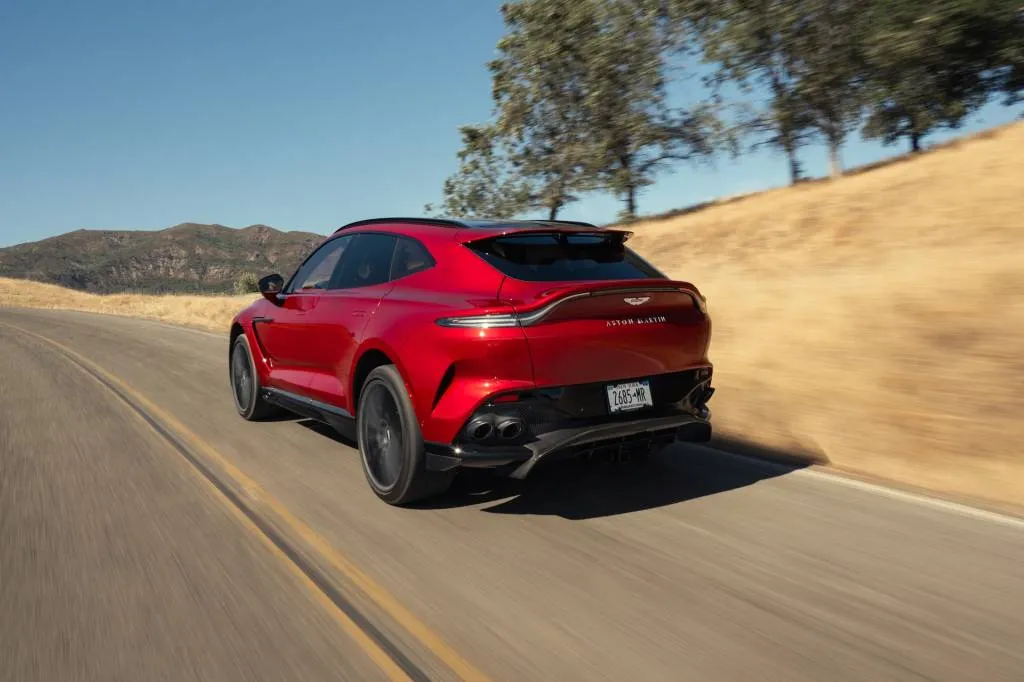
2025 Aston Martin DBX707
Aston Martin DBX707: Fine-tuned chassis
With a curb weight of 4,940 pounds, the DBX is heavy but not obese. It weighs 500 pounds less than a BMW X5 M despite stretching about three inches longer overall and in wheelbase. It saves some weight with a one-off bonded-aluminum architecture developed for the DBX and used in no other vehicle. It gives the DBX a long 120.5-inch wheelbase and a large interior but short overhangs. The body sits on a double-wishbone front suspension with a multi-link independent rear suspension, all made from aluminum.
The DBX also employs some proven technology to wrangle its weight, starting with a three-chamber air suspension and adaptive dampers with separate tuning for rebound and compression. On top of that, Aston Martin adds active anti-roll bars front and rear that create up to 1,032 lb-ft of torque via a 48-volt system to fight body lean. The air suspension can raise the DBX by 1.8 inches or lower it by 1.2 inches (though the Sport and aero modes lower it 0.8 inch) from its standard 6.9 inches of ground clearance.
That’s all carry-over and it has made the DBX quite agile from the start. The change for 2025, however, is a new suspension control module with refined parameters to react quicker to stiffen for corners and loosen up for cruising. The controller takes into account steering angle, throttle and brake position, and the six axis body motions: forward and backward pitch, lateral acceleration side to side, and roll side to side.
On these sometimes winding, sometimes tight and twisty roads, the DBX707 turns in sharply, rotates willingly, and leans just enough in turns to give me feedback. With a 14.4:1 ratio, the steering is weighty to maintain stability in the sweepers. It’s also quick, which is helpful when the corners become hairpins. It’s so quick that it’s part of a rowdy overall character for a vehicle that will most often be used as the family hauler.
According to chief engineer Andy Tokley, the active anti-roll bars can act like rear-wheel steering to virtually shorten the wheelbase in corners. To help the DBX rotate, the suspension controller first stiffens the front anti-roll bar. Then, when the system detects lateral acceleration—i.e. cornering forces—it stiffens the rear bar to help the rear end follow. This behavior must be at work in some enthusiastically driven corners on the notoriously tight and twisty Skaggs Springs Road, where I’d expect some understeer but the DBX rotates instead.
Aston Martin outfits the DBX707 with a big set of standard carbon-ceramic brakes: 16.5-inch rotors up front with 6-piston calipers, and 15.0-inch rotors in the rear with single-piston calipers. Those big dinner plates handle a full day of attacking mountain roads, though I do feel a little sponginess in the pedal by the end of the day, which will certainly bounce back for the next driver.
Dynamically, I’d put the DBX on a short list of crossover SUVs that I’d want on a mountain road or even a track. They include the BMW X5 M/X6 M and the smaller X3 M/X4 M, the Porsche Macan and Cayenne, and the Lamborghini Urus.
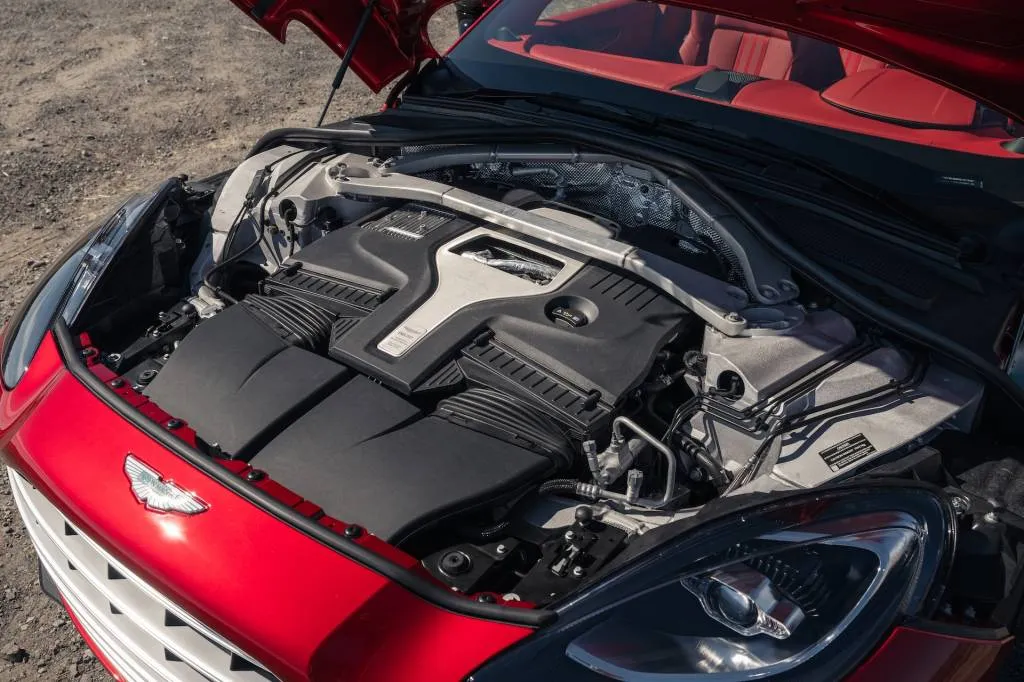
2025 Aston Martin DBX707
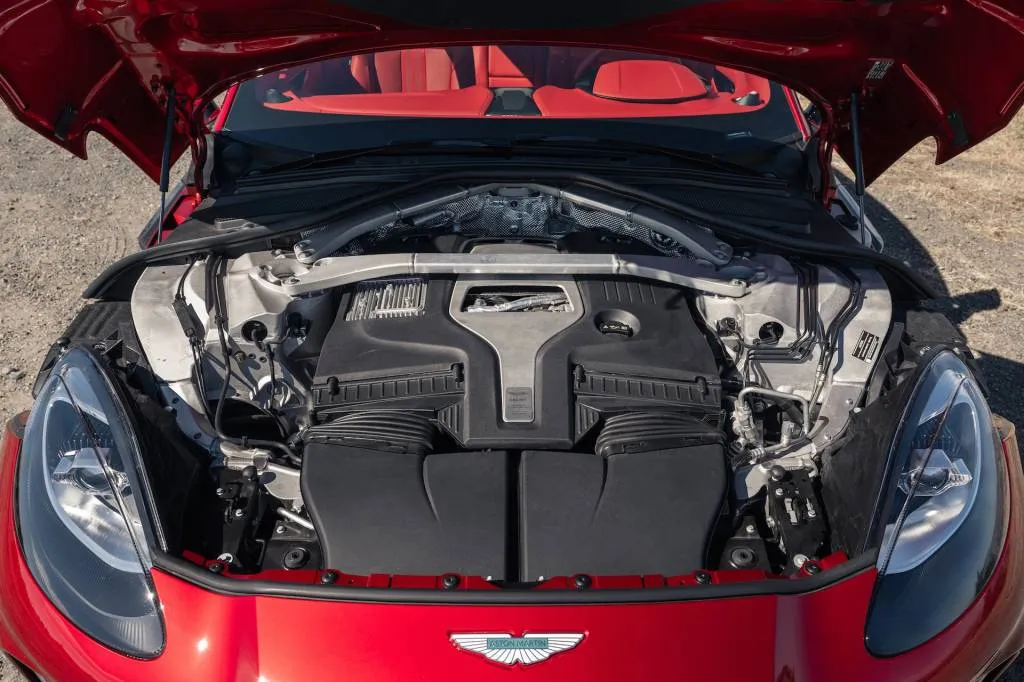
2025 Aston Martin DBX707
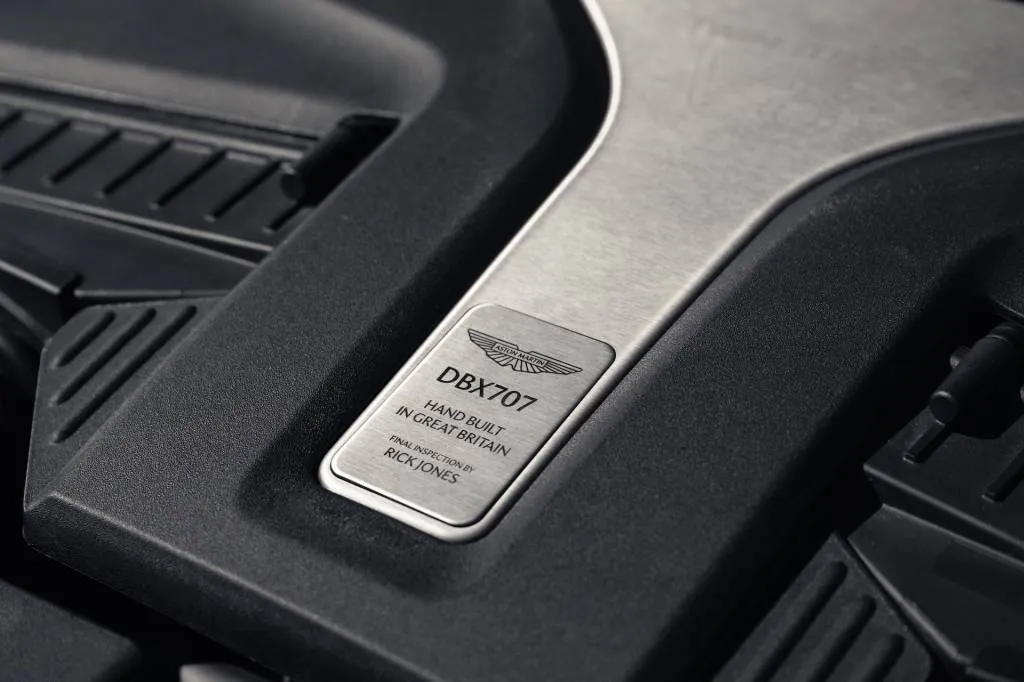
2025 Aston Martin DBX707
Aston Martin DBX707: Power to spare
Under the DBX707’s curvaceous hood lies a Mercedes-AMG-sourced twin-turbocharged 4.0-liter V-8 that’s even more raucous than in its AMG applications. It’s a strong engine anywhere it’s used, but here Aston Martin pumps 25.2 psi of boost down its gullet rather than the 17.7 psi of the former base engine.
The DBX707 begs you to get on the gas. The power hits hard from a stop and keeps building. The 0-60 mph run takes just 3.1 seconds, according to both Aston Martin and my butt dyno, and this beast can hit a top speed of 193 mph.
The proper British gents at Aston also gave the engine a wailing banshee’s scream. Its deep rumble is a constant companion, and it raises in pitch and intensity when you get on the gas. It also lets out braps between gears, as well as pops and crackles on overrun. Turn up the drive mode to Sport or Sport+ and it gets even louder and deeper, burrowing its drumbeat into your soul. It’s never subdued when you dig deep into the throttle, so some suburbanites might feel it’s just too much.
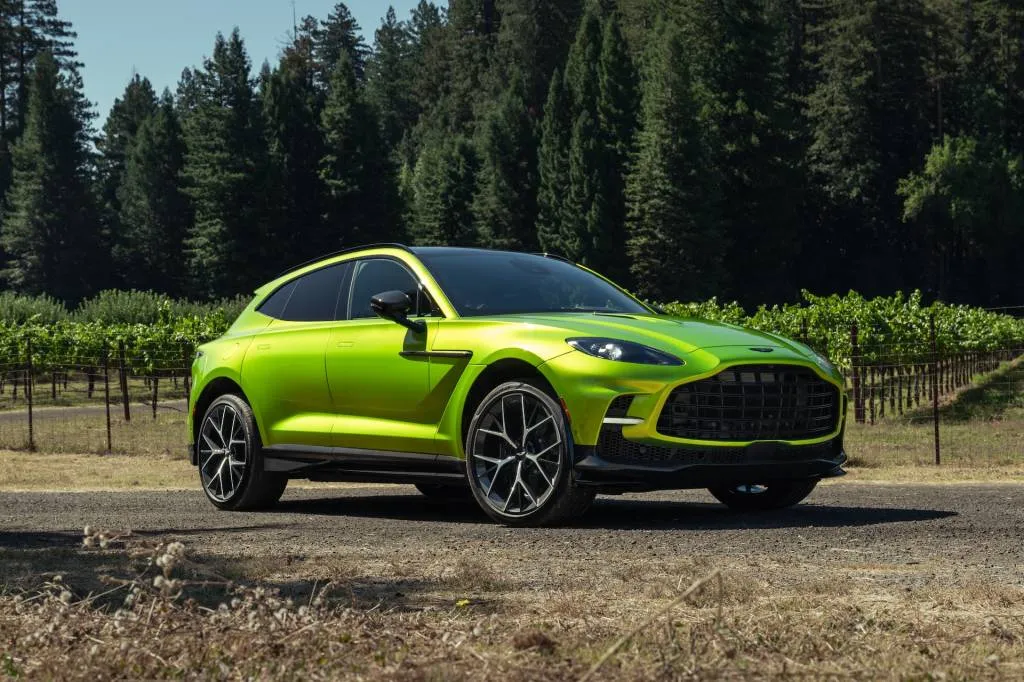
2025 Aston Martin DBX707
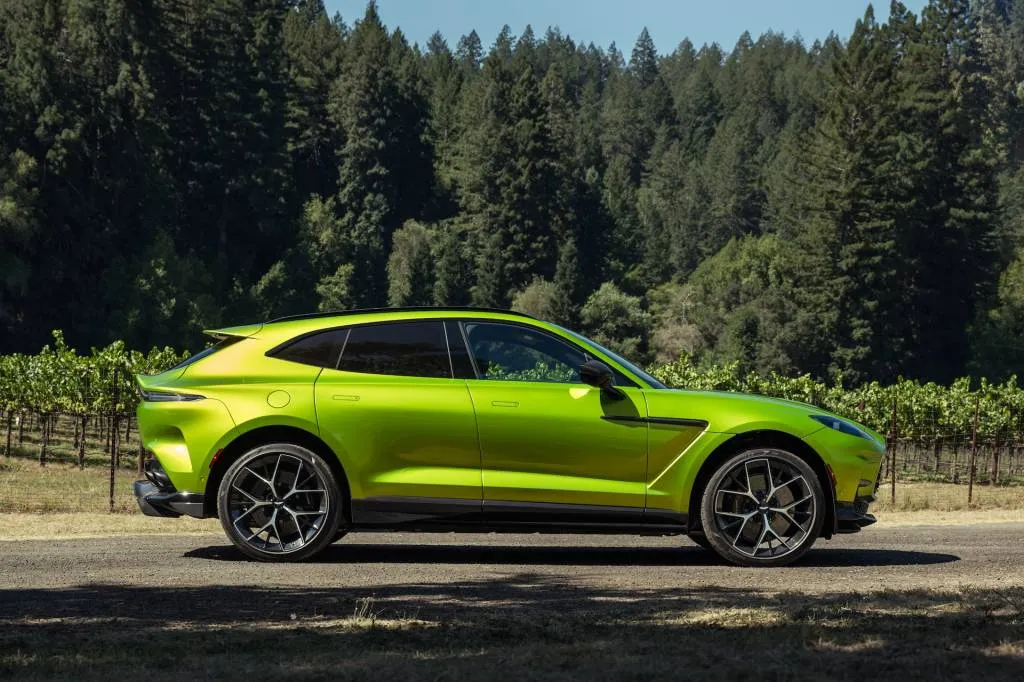
2025 Aston Martin DBX707
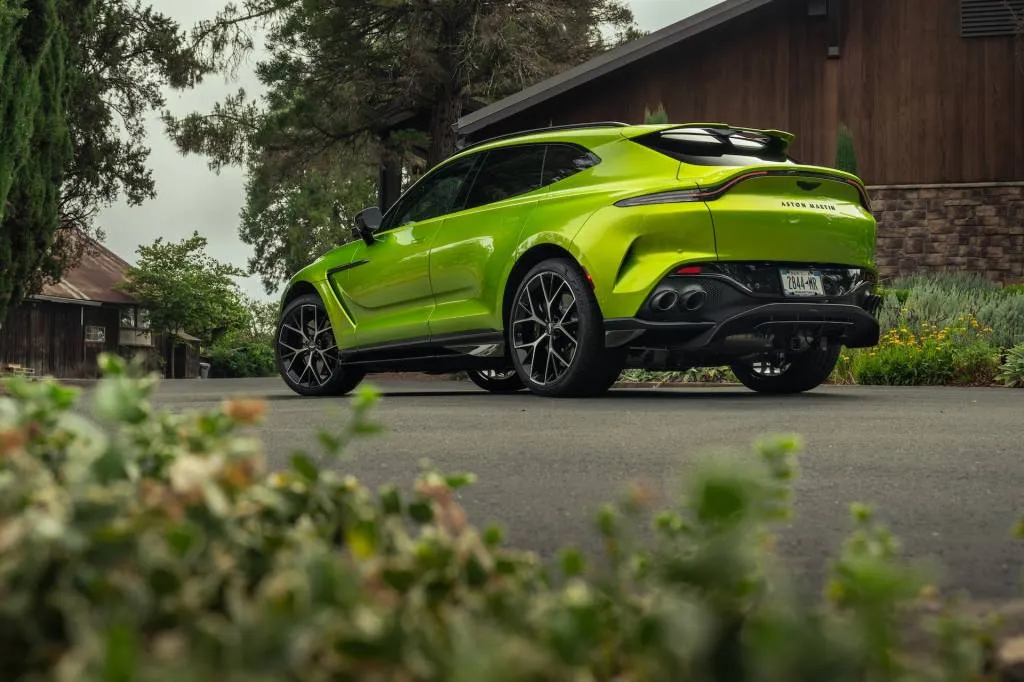
2025 Aston Martin DBX707
Power flows to all four wheels through a Mercedes 9-speed automatic transmission with a wet clutch, the same trans used in most AMG products. The all-wheel-drive system is fully variable. It sends about 70% of the power to the rear wheels in the default GT mode, and that goes to 90-95% in the Sport and Sport+ modes, though normal cruising sends all the power to the rear as the front tires aren’t needed.
With GT, Sport, Sport+, Individual, Terrain, and Wet modes at my disposal, I give the first three a try. Throttle response is relatively sedate in GT. The throttle perks up in Sport mode, and the 9-speed’s shifts crack off even quicker. Both get even quicker in Sport+, but Aston says Sport mode is the quicker way around a track, as Sport+ loosens the stability control to let the DBX slide. Slides aren’t a good idea on public roads, however, so I can’t feel that difference.
Eventually, I configure Individual mode to my liking by going with the sportiest settings for the exhaust and powertrain but opting for the softest damper setting. The ride with these optional 23-inch wheels gets a little crispy in the Sport and Sport+ modes without rattling my teeth, but I still prefer the firm but forgiving GT ride quality. The 22s should provide a little softer ride.
Aston Martin doesn’t provide a reason to use Terrain mode on this drive, and I can’t imagine the low-profile Pirelli P Zero tires would do well on anything other than a dirt road to a campsite. The 1.8 inches of additional ride height will help it get over minor obstacles on the way to those campsites, though.
I also have no chance to tow. The DBX is rated to pull a decent 5,940 pounds, and that hitch receiver looks awfully weird beneath the optional carbon-fiber rear diffuser of this test vehicle.
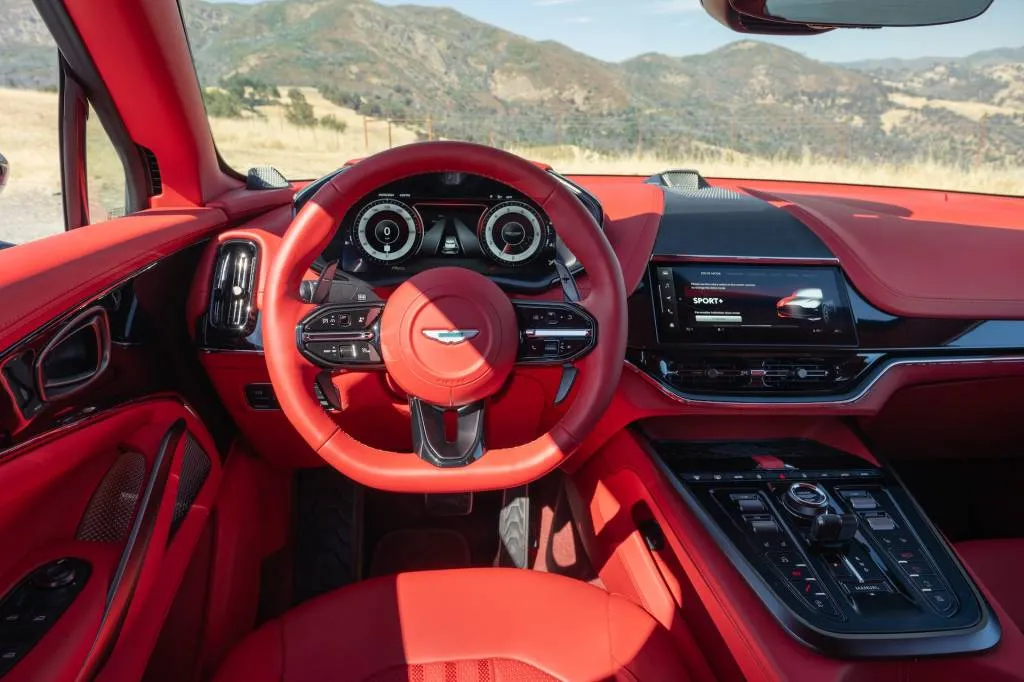
2025 Aston Martin DBX707
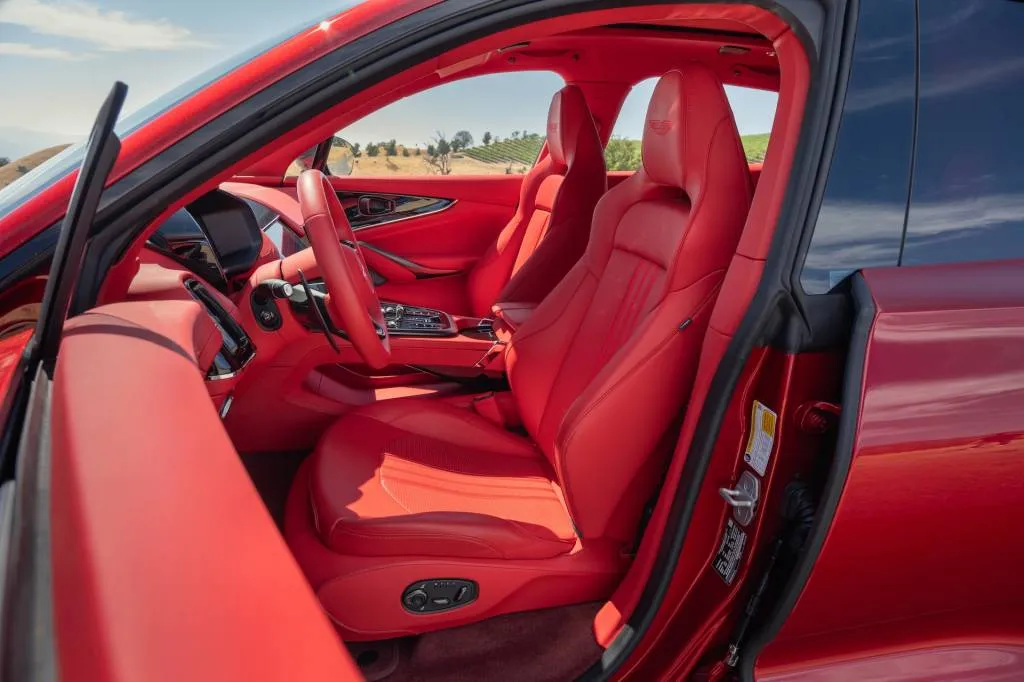
2025 Aston Martin DBX707
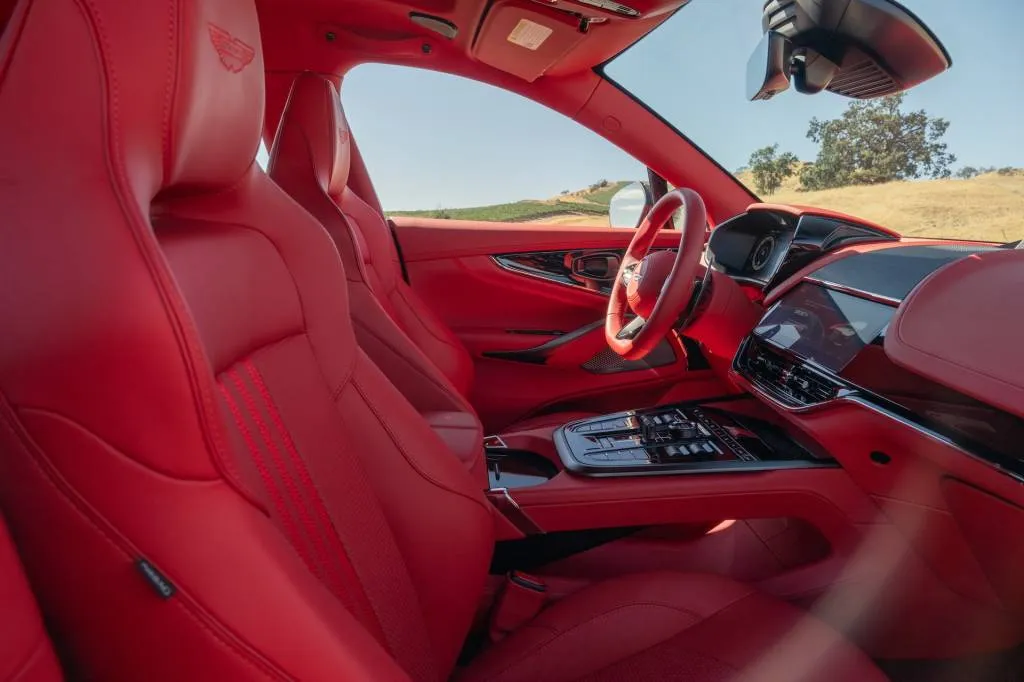
2025 Aston Martin DBX707
Aston Martin DBX707: Ultraluxury interior
I’m seeing red the entire drive, not just because I want to attack the road or dig deep into the power, but because this tester is painted a deep Supernova Red with a Spicy Red semi-aniline leather interior. Separately, I’d like both colors, but they don’t match because the exterior is darker than the interior. Both colors are part of the extroverted character of the DBX. Don’t like red? You can also opt for orange, a variety of blues and greens, purple, mocha, tan, and, yes, black. Most of those hues aren’t exactly understated.
The red paint is a $13,600 Q Special option, while the interior adds $11,900 for its monochromatic red upholstery, $3,300 for its matching carpet, $3,100 for its synthetic suede headliner, $900 for its heated steering wheel, and $12,300 for the 23-speaker, 1,600-watt Bowers & Wilkins audio system with metal speaker grilles that provide a contrast in a sea of red. The other contrasting trim is shiny piano black wood. I’d much prefer the available titanium mesh, carbon-fiber, or either of the smoked oak or dark ziricote woods, as piano black attracts fingerprints.
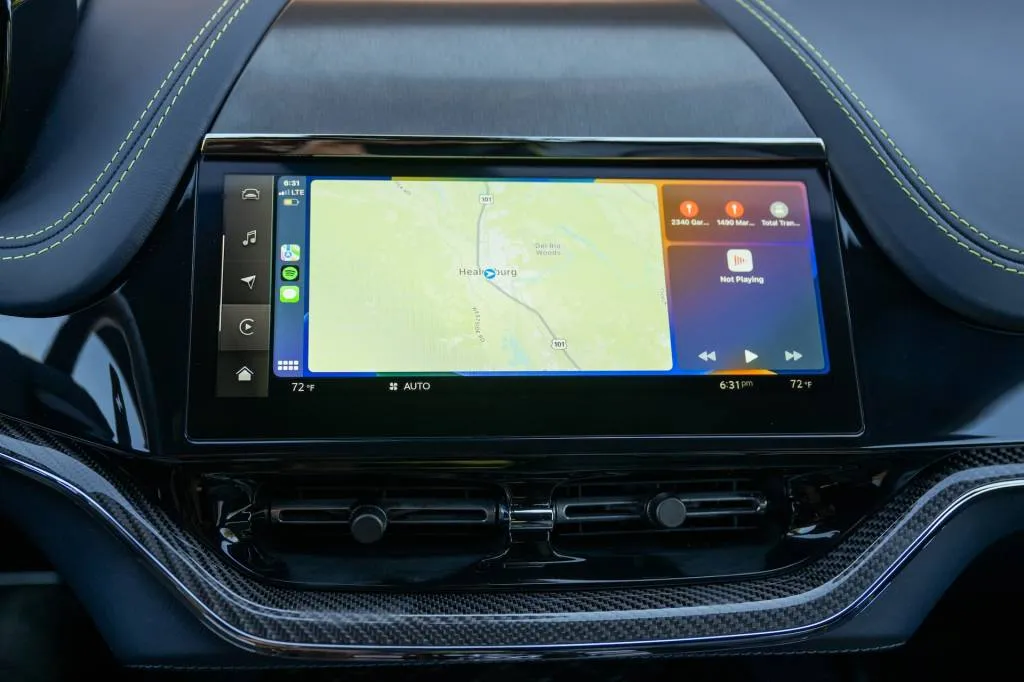
2025 Aston Martin DBX707
The big change in the cabin this year is the new 12.3-inch digital instrument cluster and 10.3-inch center touchscreen that runs a new infotainment system developed in-house to replace the older Mercedes-based system. While the new touchscreen may seem decently sized, it feels small here, and the icons in Apple CarPlay are especially small, making them hard to hit. Initially, Google Maps in CarPlay also seems to run slow, failing to keep up with the vehicle as I approach corners. It seems to catch up later, though.
Along with the new screen comes a new design of the center stack and center console. The center stack takes on a more traditional, more understated look compared to the horse-collar design it sported last year. The center console loses its Mercedes-sourced handrest and rotary dial, as well as its rotary shift dial, and gains a small Braun shaver-like gear lever (a la Porsche 911), and a less-cluttered control interface. That interface includes climate control and volume rollers at the front, with separate buttons for the sport settings of the exhaust system, traction control, and dampers toward the rear, along with other assorted controls.
Other changes to the cabin include a new steering wheel design, plus new designs for the air vents and door handles. It’s all lovingly assembled with beautiful materials.
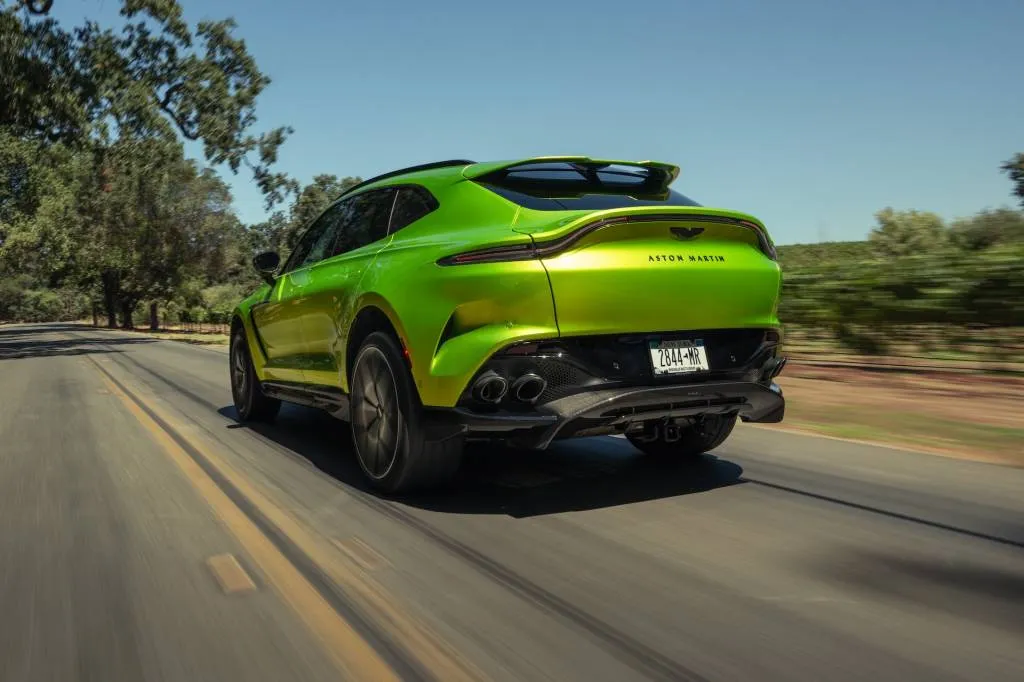
2025 Aston Martin DBX707
With a boisterous personality comes a boisterous price. The DBX707 starts at $253,000, including a $4,000 destination charge, and my tester checks in at $342,000 due to those paint and interior options plus $10,800 for an upper Carbon Pack, $19,500 for a lower S Carbon Fiber package, $7,200 for the 23-inch wheels, and $1,800 for a hitch receiver, among other minor items.
All that money will buy you an SUV that’s more than handsome. Its looks and powertrain can be loud and obnoxious, but in a good way, like your lovable life-of-the-party friend who sometimes doesn’t know when to shut up. But it also buys a big vehicle with the moves of a much smaller car.
It shouldn’t move like this, but it does. It just requires a lot of money to make that happen.
Aston Martin paid for travel and lodging for Motor Authority to bring you this firsthand report.
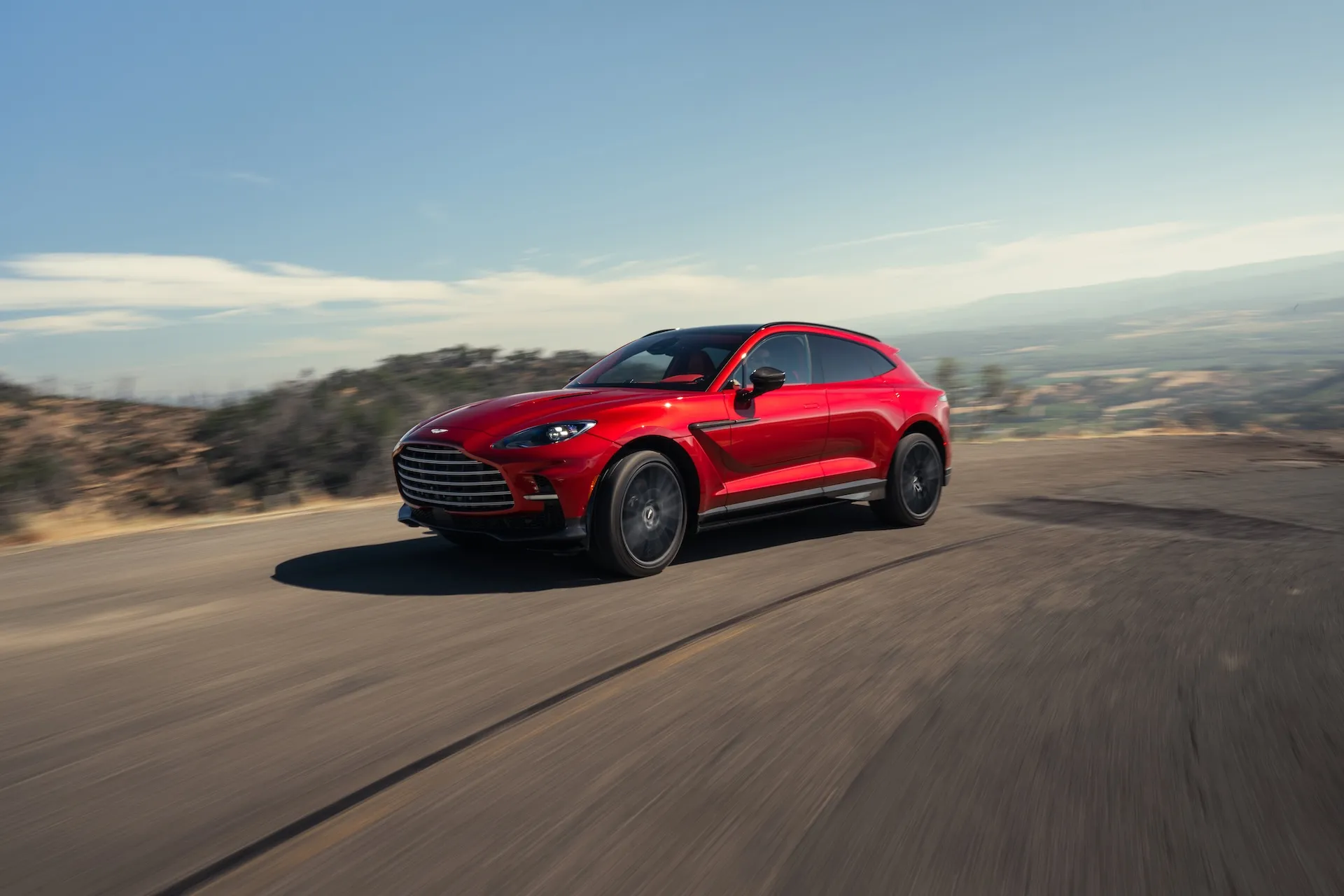
For instance, if I put sensors on my glutes as I carried
out the train, which is contracting hard to stabilize my body, you’d see quite a high activation.
Nonetheless, when you have a glance at the standing shoulder
press, you don’t see this. But the standing variations do have their benefits as properly since they get the core
and complete body concerned. And, as you’ll study afterward, the standing versions additionally offered a
special kind of demand on the shoulders. This means… we needed to head back to the same public health
club as final time to see if they’ll allow us to borrow their pec deck machine.
We additionally rotated between front delt, aspect delt, and rear delt
exercises to keep away from overly fatiguing one area.
The more weight you presumably can load, the more you can fatigue the muscle to trigger development.
An overhead press variation I advocate to advanced powerlifters is the Z-Press
(click to take a look at my complete train guide). When the goal is training for strength, you need to
ensure that no matter train you implement instantly pertains to growing
power or method in your powerlifting movements.
In order to prevent this from happening, you presumably can actively
pull your shoulder blades “back and down”, which “sets” the shoulder blades on the rib cage.
This position allows the arm to effectively and safely produce as much force as possible.
The Barbell Z Press is a difficult and efficient shoulder exercise that strongman Zydrunas
Savickas popularized, therefore the name “Z Press. In different words, this variation requires much less effort to stabilize body place during the row as a outcome of the chest is supported on the bench. It is an efficient and efficient way to obtain a full-body workout in a brief period of time. It is feasible to overload the muscle tissue with the barbell to a higher diploma than one could also be able to doing with dumbbells. Be certain to bookmark this guide as your go-to useful resource for building sturdy, resilient shoulders. When starting with shoulder coaching, terms like “Landmine Press” and “Dumbbell Clear and Press” can get a little overwhelming.
We can delve deeper into the pros and cons of every of those exercises, then assemble them into the right shoulder workout. The towel shoulder stretch could feel awkward at first, but once you get the grasp of it, you’ll start to really feel aid in the rotator cuff muscular tissues. This stretch is commonly included in a rehab program when recovering from shoulder surgery or coping with a frozen shoulder. The anterior shoulder stretch may help open your chest and pull the shoulders back and down.
Additionally called a pike push-up or down-dog push-up, this move is like a push-up for your shoulders; you are in a pike place doing push-ups. As Soon As your training begins to stall, it is time to swap issues up. This is relatively easy to do as you’ll simply swap out exercises with similar biomechanics.
As for reps, ideally, you need to use a rep vary of roughly reps per set. And then, once you presumably can carry out more than roughly 30 reps per set in any of the exercises, you need to then progress to a more durable variation that I supplied for every motion. You’ll wish to maintain your arms tucked to your sides and the train motion to your elbow joint to force your triceps to do the work. If you begin transferring your higher arms, you contain different muscle groups just like the latissimus dorsi.
If you’re feeling additional robust, throw in some handstand push-ups while you’re at it. It’s a double whammy for the lateral delts and higher body strength. Pike push-ups are a ripper method to goal the anterior delts, and they give the chest and triceps a solid exercise too. Ryan over at MinusTheGym has a ripper tutorial on pike push-ups, even if you find them powerful to start with. If you are keen to make them harder (and extra effective), try using tall parallettes to increase your range of motion.
The wall posterior delts isolation train is are perfect body weight exercises for arms and shoulders that hit your rear delts. Which are crucial for shoulder stability and balanced upper body energy. Utilizing the wall as resistance, this bodyweight move helps isolate and strengthen those rear delts. It’s a simple yet efficient exercise, specializing in horizontal abduction and exterior rotation – a nice approach to build muscle and endurance with none gear. As we have established, you’re doubtless getting plenty of shoulder work via conventional strength training routines. Certain components of your shoulders, specifically your rear delts, are typically underdeveloped via more common coaching, so some centered work may be especially helpful. Some of one of the best barbell shoulder workout routines embrace the overhead press.
The chest and shoulder exercise is intended for intermediate to superior lifters. You can stand whereas doing a shoulder train to fetch higher outcomes on the core. A seated press promotes back and shoulder stability, which reduces the need to involve the core. If you’re on the lookout for an entire fullbody workout program with difficult workouts, I’ve received you covered! See which of our ATHLEAN-X applications finest meets your health targets. With our carry movement we’re going to be accruing further quantity. Our targets with this useful exercise are to get an additional conditioning effect from the carry, and to construct grip sustainability which is ready to profit us in our major lifts.
References:
mass stack steroids – Kristian,
70918248
References:
natural steroids to build muscle
70918248
References:
anabolic Steroids for body building (http://www.Tuzh.Top)
70918248
References:
natural bodybuilder vs steroids, Wilma,
70918248
References:
How To Buy Steroid Online (Romancefrica.Com)